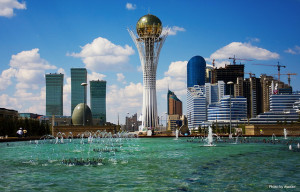
During the last few months more and more economic news has kept coming from Kazakhstan. For example, in August national currency, tenge, collapsed by one-third when the government decided to let it float freely and
urged residents and officials to get used to an oil price of 30-40 dollars per barrel. The free falling of tenge continued in September. At the same time the president acknowledged that the economy is in a crisis that affects all enterprises without exception. He highlighted several negative factors: prices for export commodities will be low for another five years, availability of foreign investments will be restricted, export to Russia and China will reduce. Prime Minister Karim Masimov said that in this new economy Kazakhstan is to be guided by the experiences of Canada and Australia.
Perhaps coincidentally, in the prior month Kazakhstan had completed negotiations, lasting almost 20 years, regarding joining the World Trade Organization (WTO). In order for Kazakhstan to become a full, 162nd member of the WTO in 2016 the only remaining task is to ratify the documents. The parliament plans to do that this autumn. This has raised concerns among Russian officials, who quite reasonably believe that it carries serious risks for Russia. Kazakhstan is a member of the Eurasian Economic Union and the Customs Union of the Eurasian Economic Community, and a change of charges needed to bring them in compliance with the WTO’s requirements, can affect the economies of other member countries.
In the first half of 2015 Kazakhstan outran Russia in such important economic indicator as GDP per capita. It is too early to say that Kazakhstan’s economy will overtake Russian: the former is currently nine times smaller than the latter, 212 versus 1876 billion. However Russia has pushed closer to its competitor by itself, getting sanctioned by the West as well as of self-imposing counter-sanctions. Meanwhile, private businesses continue to run from Russia to other countries, including Kazakhstan. Despite similar conditions, Kazakhstan’s tax system is more stable and less burdensome for companies than that of Russia. There is another important indicator of the business climate: in 2014 the Corruption Perception Index of Russia fell below that of Kazakhstan for the first time. Even the pension system of the Asian neighbor is considered more modern and dynamic. According to experts, Kazakhstan is becoming an “entry point” into the post-Soviet economic space, gradually displacing Moscow.
The change in the economic position of Kazakhstan in relation to Russia is a landmark event. For the first time in the nearly 25 years since the collapse of the Soviet Union, Russia has lost its position compared to the other former Soviet republic, where economic growth rates have been significantly higher than worldwide average in recent years. According to the International Monetary Fund’s forecast, Kazakhstan will shoot ahead and become a leader of economic growth. Since 2008 labor productivity in Russia has sharply decreased and in Kazakhstan has increased. Such productivity is an indication of the technological level of the economy and, as a rule, the pace of its growth coincides with the pace of modernization. The tax burden on business also differs between countries: it is 25% of the GDP in Kazakhstan and over 35% in Russia (compared to China’s 20% and Turkey’s 22%). The difference in the reallocation of funds is also interesting. Public servants in Russia amount to 30% of the population while in Kazakhstan they represent 20%. In comparison in “socialist” China it is 10%. The defense spending of Russian budget is 4% and it continues to grow, while in Kazakhstan such expenses are only 1%. The share of small and medium business in the GDP is 24% in Kazakhstan and it is slowly but surely growing, while in Russia it is 20% and the number is declining. Some businesses find it easier to exist in Russia: contracts are generally executed better and it is easier to get a loan, but Kazakhstan looks better in the field of construction permits, connection to the electrical grid, and protection of minority shareholders in companies.

Considering all of the above, the latest news from the official site of President Nursultan Nazarbayev is not surprising. “The President of Kazakhstan arrived to Beijing for a state visit, in the framework of which a bilateral meeting with Chinese President Xi Jinping will take place. Nursultan Nazarbayev also will meet with representatives of political and business groups and participate in the parade dedicated to the 70th anniversary of the victory in the war of Chinese People’s resistance against Japanese aggression.”
On August 31, Nazarbayev held talks with the head of China, during which documents, including the agreement to strengthen cooperation in the fields of industrialization and investment, were signed. He also met with the chairmen CITIC Group Corporation, Tsinghua Corporation and China National Petroleum Corporation.
Despite his advanced age, President Nazarbayev is thinking in the right direction. While Moscow shouts to the whole world about its mega-projects, such as “Turkish Stream” or “Power of Siberia“, Astana is moving forward, slowly pushing its northern neighbor out of its beloved eastern direction.





